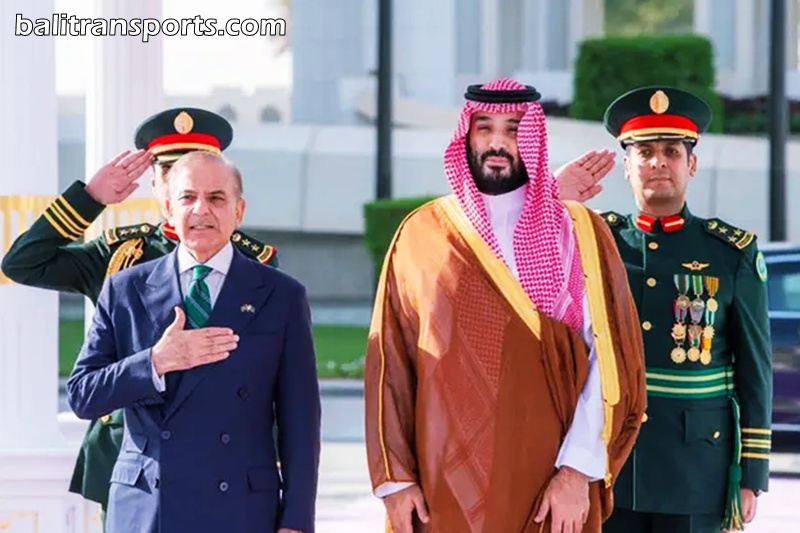Thursday | 18th September 2025
Saudi Arabia and nuclear-armed Pakistan signed a formal mutual defense pact on Wednesday, marking a watershed moment in their decades-long strategic partnership and signaling a potential reshaping of security dynamics in the Middle East and South Asia. The pact, sealed in Riyadh during a high-profile ceremony attended by senior political and military leaders, represents one of the most explicit defense commitments either nation has made in recent years.
The deal comes at a time of heightened regional volatility and growing uncertainty over the future of U.S. security guarantees in the Gulf. For decades, Washington served as the primary guarantor of Gulf monarchies’ security, stationing troops and advanced weaponry in the region. But with shifting U.S. priorities toward Asia and mounting frustrations over Washington’s handling of the war in Gaza, Gulf states have increasingly sought to diversify their security partnerships.
Concerns reached a new pitch after Israel launched a surprise airstrike on Doha last week, targeting Hamas political leaders who were engaged in ceasefire talks under Qatari mediation. The attack, which Arab officials condemned as reckless and destabilizing, underscored the vulnerability of even the wealthiest Gulf states to direct assaults. Qatar, a close Saudi neighbor, has now suffered two direct attacks in less than a year — one from Iran and another from Israel — reinforcing fears that the region’s fragile security environment could spiral further out of control.
Against this backdrop, Saudi officials framed the defense pact with Pakistan not as a reaction to any one incident, but as a natural evolution of a long-trusted partnership. “This agreement is a culmination of years of discussions. This is not a response to specific countries or specific events but an institutionalization of longstanding and deep cooperation between our two countries,” a senior Saudi official told Reuters.
The text of the agreement, released by Pakistan’s prime minister’s office, is sweeping in scope. It commits Riyadh and Islamabad to consider an attack on either state as an attack on both, pledging “joint deterrence against any aggression.” The pact also envisions expanded military cooperation, joint training, and defense technology sharing. While neither side explicitly mentioned nuclear weapons, the question of whether Pakistan’s arsenal could serve as a protective shield for Saudi Arabia loomed large. Asked directly, a Saudi official described the pact as “a comprehensive defensive agreement that encompasses all military means.”
Symbolism underscored the ceremony itself. Pakistani Prime Minister Shehbaz Sharif and Saudi Crown Prince Mohammed bin Salman — the kingdom’s de facto ruler — embraced warmly after signing the accord, flanked by Field Marshal Asim Munir, Pakistan’s powerful army chief. State television in Islamabad portrayed the moment as a triumph of Pakistan’s global relevance at a time when the country faces severe economic struggles at home.
For Pakistan, the deal represents both an affirmation of its historic role as Saudi Arabia’s security partner and a strategic counterweight in its own tense neighborhood. Only months ago, Pakistan fought a short but intense military clash with archrival India, another nuclear power. New Delhi responded cautiously to the Saudi-Pakistani announcement. “India is aware of the development,” Ministry of External Affairs spokesman Randhir Jaiswal posted on X. “We will study its implications for New Delhi’s security and for regional stability.”
Saudi officials, meanwhile, sought to calm fears that the agreement might tilt the kingdom away from its steadily expanding ties with India, which has become a vital energy customer and investment partner. “Our relationship with India is more robust than it has ever been,” the Saudi official said, stressing that Riyadh aims to balance both relationships and “contribute to regional peace whichever way we can.”
Analysts say the pact could significantly shift the region’s strategic calculus. By aligning more closely with Pakistan, Saudi Arabia gains access to one of the world’s most battle-hardened militaries and, potentially, a nuclear backstop. Pakistan, in turn, secures deeper political and financial ties with its most generous benefactor. The move also signals to Washington that the Gulf’s largest power is no longer content to rely solely on U.S. protection in an increasingly multipolar world.
Still, the agreement carries risks. It could exacerbate rivalries with Iran, further unsettle India, and complicate Riyadh’s tentative outreach to Israel. Yet for now, Saudi and Pakistani leaders are presenting the deal as a bold step toward regional stability. “This agreement reflects the shared commitment of both nations to enhance their security and to achieve peace in the region and the world,” Pakistan’s prime minister’s office declared.

